Along with MSU faculty, students, and staff, the following distinguished invitees from Africa participated in the the Alliance for African Partnership Convening—working together to find innovative ways to address the emerging challenges facing the African continent.
To learn more about each participant, click on their names below.
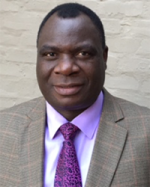 Aggrey Ambali is Head of NEPAD Science, Technology and Innovation Hub (NSTIH) at the NEPAD Agency. He oversees programmes in science, technology and innovation, education and health under the human development thematic area. At the NEPAD Agency, he has also served as Director of Policy Alignment and Programme Development; Advisor on science and technology and Coordinator of the African Biosciences Initiative (ABI). In the area of science, technology and innovation, he coordinated the development of the Science, Technology and Innovation Strategy, 2014-2024 (STISA 2024) of the African Union. Prior to joining the NEPAD Agency, he served as Professor of Biology at the University of Malawi.
Aggrey Ambali is Head of NEPAD Science, Technology and Innovation Hub (NSTIH) at the NEPAD Agency. He oversees programmes in science, technology and innovation, education and health under the human development thematic area. At the NEPAD Agency, he has also served as Director of Policy Alignment and Programme Development; Advisor on science and technology and Coordinator of the African Biosciences Initiative (ABI). In the area of science, technology and innovation, he coordinated the development of the Science, Technology and Innovation Strategy, 2014-2024 (STISA 2024) of the African Union. Prior to joining the NEPAD Agency, he served as Professor of Biology at the University of Malawi.
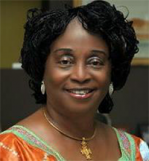 Dr. Thelma Awori, Chair Emeritus, Founding Chair and President, Sirleaf Market Women's Fund, (Liberia); Former Assistant Secretary General and Director, of the Regional Bureau for Africa, UNDP
Dr. Thelma Awori, Chair Emeritus, Founding Chair and President, Sirleaf Market Women's Fund, (Liberia); Former Assistant Secretary General and Director, of the Regional Bureau for Africa, UNDP
Dr. Thelma Awori was the Founding Chair and President of the Sirleaf Market Women's Fund, an organization which was named in honor of Ellen Johnson Sirleaf, Africa's first female president and the granddaughter of a market woman. The fund helps to build decent workplaces for thousands of market women, enhances their voices in policy making at regional and national levels and offers them direct services such as credit, literacy, water and sanitation, storage, and child care for their children. Her work with market women in urban and rural markets has positioned her well for membership of the Urban Strategy Council of GDF Suez. She is a member of the Global Advisory Board of the Hairou Commission which among other things promotes the participation of women in urban development. Dr. Awori has a passion for promoting transformational leadership among rural women. To further this goal she has established the Institute for Social Transformation that develops leadership and critical thinking skills among women at the community level in rural and urban areas and among development practitioners who work with this target group.
Dr. Awori is also experienced in the area of women and international peace keeping which has been invaluable in her tenure as President of Isis Women's Cross Cultural Exchange and member of the Board of Femme African Solidarity, two organizations that focus on this issue. She also served as a member of the Civil Society Advisory Group to the Secretary General on UN Security Council Resolution 1325.
Thelma Awori, a Liberian/Ugandan, received her BA (Hons. cum laude) in Social Relations and Cultural Anthropology from Harvard University and MA in Adult Education and Humanistic Psychology from the University of California, Berkeley. She recently received her Ed.D from Teachers College, Columbia University in New York.
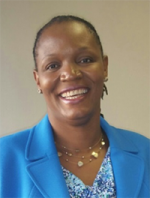 Chimwemwe Felistas Chamdimba is a Senior Programme Officer at the AU/NEPAD Agency in the Industrialization, Science, Technology, and Innovation Hub. She is an Agricultural Economist from Lilongwe University of Agriculture and Natural Resources (LUANAR) in Malawi. She previously served in the Programmes Coordinating Office of Bunda College (now LUANAR) as the Monitoring and Evaluation Specialist and lectured on topics in Agricultural Statistics and Computers. Mrs. Chamdimba earned a Master of Science Degree in Agricultural Economics from The University of Malawi, Bunda College in 2007. She also has a Bachelor of Science Degree in Agriculture specializing in Agricultural Economics obtained in 2002. She has worked as a project officer for the Malawi National Assembly's Budget and Finance Committee responsible for the sectors of Agriculture and health. Her major areas of experience are in international development, policy reforms and regional harmonization; design and management of a research and development competitive grant scheme; and project planning monitoring and evaluation. Her areas of interest in research include industrialization, innovation and agricultural productivity, and policy analysis.
Chimwemwe Felistas Chamdimba is a Senior Programme Officer at the AU/NEPAD Agency in the Industrialization, Science, Technology, and Innovation Hub. She is an Agricultural Economist from Lilongwe University of Agriculture and Natural Resources (LUANAR) in Malawi. She previously served in the Programmes Coordinating Office of Bunda College (now LUANAR) as the Monitoring and Evaluation Specialist and lectured on topics in Agricultural Statistics and Computers. Mrs. Chamdimba earned a Master of Science Degree in Agricultural Economics from The University of Malawi, Bunda College in 2007. She also has a Bachelor of Science Degree in Agriculture specializing in Agricultural Economics obtained in 2002. She has worked as a project officer for the Malawi National Assembly's Budget and Finance Committee responsible for the sectors of Agriculture and health. Her major areas of experience are in international development, policy reforms and regional harmonization; design and management of a research and development competitive grant scheme; and project planning monitoring and evaluation. Her areas of interest in research include industrialization, innovation and agricultural productivity, and policy analysis.
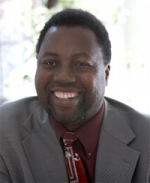 Sosten Chiotha is the Regional Director of the Leadership for Environment and Development (LEAD) Southern and Eastern Africa. LEAD is collaborating with a number of partners to implement research and development projects on climate change adaptation, ecosystem services as well as capacity building on the linkage between population, environment and development. He is also a Board member of the African Institute for Development Policy (AFIDEP).
Sosten Chiotha is the Regional Director of the Leadership for Environment and Development (LEAD) Southern and Eastern Africa. LEAD is collaborating with a number of partners to implement research and development projects on climate change adaptation, ecosystem services as well as capacity building on the linkage between population, environment and development. He is also a Board member of the African Institute for Development Policy (AFIDEP).
Previously, he served as the first Board Chair of the Malawi National Commission of Science and Technology, and currently serves on the Advisory Board of the Southern Voices on Climate Change (SDV). He has been involved in the drafting of the Malawi National Environmental Action Plan (NEAP) and more recently in the drafting of the Malawi Climate Change Policy and Malawi Meteorological Policy.
Professor Chiotha was the Lead author of the 2010 Malawi Environment and Outlook Report and apart from Lecturing on medical parasitology at Chancellor College, University of Malawi, also served as the University's Research and Masters in Environmental Science Programme Coordinators.
Sosten Chiotha is a graduate of the University of Malawi (Bachelor of Education), London School of Hygiene and Tropical Medicine (Master of Science in Medical Parasitology) and University of Maryland, USA (PhD in Marine, Estuarine and Environmental Science).
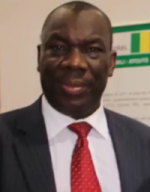 Dr. Nango Dembélé currently serves as the Minister of Livestock and Fisheries in the Government of Mali. Dr. Dembélé has over 30 years of experience working on critical food policy issues in West Africa, with a particular focus on Mali. He has served as Minister/Food Security Commissioner of Mali. In that capacity, he leads Mali's efforts to ensure reliable access to food for all of the country's 15 million people, has implemented innovative reforms that increase the efficiency and effectiveness of Mali's food aid and national food reserve programs, and serves as the top food policy advisor to the country's President. From September 2013 through April, 2014, Dr. Dembélé served as Deputy Minister of Rural Development in charge of Livestock, Fisheries and Food Security. In this role, he worked intensively with local and international industries to attract private investment in different agricultural value-chains and to promote outgrower schemes. For 15 years prior to his taking on these high-level government positions, Dr. Dembélé served as an MSU faculty member based in Mali, where he coordinated MSU's collaborative agricultural and food security research and outreach programs based in West Africa.
Dr. Nango Dembélé currently serves as the Minister of Livestock and Fisheries in the Government of Mali. Dr. Dembélé has over 30 years of experience working on critical food policy issues in West Africa, with a particular focus on Mali. He has served as Minister/Food Security Commissioner of Mali. In that capacity, he leads Mali's efforts to ensure reliable access to food for all of the country's 15 million people, has implemented innovative reforms that increase the efficiency and effectiveness of Mali's food aid and national food reserve programs, and serves as the top food policy advisor to the country's President. From September 2013 through April, 2014, Dr. Dembélé served as Deputy Minister of Rural Development in charge of Livestock, Fisheries and Food Security. In this role, he worked intensively with local and international industries to attract private investment in different agricultural value-chains and to promote outgrower schemes. For 15 years prior to his taking on these high-level government positions, Dr. Dembélé served as an MSU faculty member based in Mali, where he coordinated MSU's collaborative agricultural and food security research and outreach programs based in West Africa.
For many years he was a member of Mali's National Agricultural Research Council and has served as a consultant to, among others, the World Bank (contributing to the 2008 World Development Report on Agriculture for Development and to the reform of Mali's Office du Niger rice program in the early 1990s) and to the Syngenta Foundation for Sustainable Agriculture (on the foundation's strategic plan for its West African activities over the period 2012-16). He has also mentored many young West African scholars who have carried thesis research under his supervision. Prior to joining MSU's faculty, he carried out research and extension on the economics of soil fertility in West Africa as a Rockefeller Foundation Fellow (based in Burkina Faso) and served in the Malian Ministry of Public Finance as Deputy Treasurer in Tombouctou.
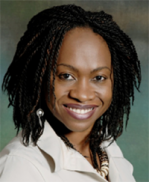 Dr. Chinwe Effiong is an International Development Specialist with over 20 years' experience. In her most recent position as the Africa Regional President for Junior Achievement (JA) Worldwide, she provided strategic direction and oversight for JA operations across sub-Saharan Africa. She worked closely with government, civil society and private sector stakeholders to raise awareness and promote support for programs that enabled young people in Africa to improve their livelihoods and take control of their future.
Dr. Chinwe Effiong is an International Development Specialist with over 20 years' experience. In her most recent position as the Africa Regional President for Junior Achievement (JA) Worldwide, she provided strategic direction and oversight for JA operations across sub-Saharan Africa. She worked closely with government, civil society and private sector stakeholders to raise awareness and promote support for programs that enabled young people in Africa to improve their livelihoods and take control of their future.
As President of JA Africa, Dr. Effiong made significant contributions to the global mission to create jobs and entrepreneurship opportunities for young people, especially those residing in the world's most marginalized communities. She designed the groundbreaking entrepreneurship curriculum for out of school youth, popularly referred to as ITS TYME (Immersion Training Strategy: Targeting Young Marginalized Entrepreneurs). In partnership with Google volunteers, she also facilitated the creation of the JA SySTEM, an innovative curriculum designed to raise awareness about careers in Science, Technology, Engineering and Mathematics (STEM) among middle and high school students, especially girls, across Africa. She has served on the Global Agenda Council of the World Economic Forum and is a member of the Clinton Global Initiative.
Prior to joining JA, Dr. Effiong was the Director of Programs for Discovery Channel Global Education Partnership in Silver Spring, MD. She also worked for several years as Country Director for Nigeria and Regional Director for East and West Africa at Africare, a Washington, D.C. based, international development organization, addressing a wide range of development needs across the continent of Africa.
Dr. Effiong started her professional career as Assistant Professor of Political Science and International Relations at Lincoln University, PA and holds an M.A. and Ph.D. in International Relations from the University of Delaware and a B.A. in English and Literary Studies from the University of Calabar, Nigeria. In addition to her professional work, Dr. Effiong is a creative writer, motivational speaker, wife and mother of three children.
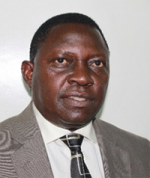 Chance Kabaghe is the Executive Director of the Indaba Agricultural Policy Research Institute (IAPRI) which is the Zambia Agricultural think tank. He is also the Chairman of the Regional Network of Agricultural Policy Research Institutes in Eastern and Southern Africa (ReNAPRI). With more than 25 years in agricultural policy and agri-business, Mr. Kabaghe is one of Zambia's leading agribusiness professionals. He has wide experience in the agri-business, government, public policy and academia, all at very high and strategic levels and, with impressively broad impact on key areas affecting agricultural development.
Chance Kabaghe is the Executive Director of the Indaba Agricultural Policy Research Institute (IAPRI) which is the Zambia Agricultural think tank. He is also the Chairman of the Regional Network of Agricultural Policy Research Institutes in Eastern and Southern Africa (ReNAPRI). With more than 25 years in agricultural policy and agri-business, Mr. Kabaghe is one of Zambia's leading agribusiness professionals. He has wide experience in the agri-business, government, public policy and academia, all at very high and strategic levels and, with impressively broad impact on key areas affecting agricultural development.
Mr. Kabaghe has played key roles in the agri-business worldwide including the promotion of the usage of hybrid maize seeds in Zambia and Africa as a whole while serving as Marketing Director of the Zambia National Seed Company (ZAMSEED) during the 1980s among others. He served in the academia as a Lecturer at the University of Zambia in the School of Agricultural Sciences before becoming the first Chief Executive Officer (CEO) of the Zambia National Food Reserve Agency (FRA) from 1995 to 2001. He further served as a Member of Parliament and later as Deputy Minister of Agriculture and Cooperatives in charge of Agriculture Marketing and Planning between 2001 and 2006.
Mr. Kabaghe chairs the Boards of some key agri-businesses in Zambia and Africa such as SeedCo International, Zambia Agricultural Commodity Exchange (ZAMACE), the Common Market for Eastern and Southern Africa (COMESA) Business Council where he serves as Chairman of Agricultural Industry Committee etc.
Mr. Kabaghe has been involved in the development and eventual enactment of several agricultural policies in Zambia which have today made the Country a critical and strategic food bread basket for the East and Southern African Region.
 Denis T. Kyetere is the Executive Director of the African Agricultural Technology Foundation (AATF) since 2012. Before joining AATF he was the Director General of Uganda's National Agricultural Research Organisation (NARO) for six years. His leadership and management experience spans across various regional organisations, networks, projects and committees including the Forum for Agricultural Research in Africa (FARA), Association for Strengthening Agricultural Research in Eastern and Central Africa (ASARECA), Eastern and Central Africa Maize & Wheat Research Network (ECAMAW) and Coffee Research Network (CORNET) where he served as Chairperson.
Denis T. Kyetere is the Executive Director of the African Agricultural Technology Foundation (AATF) since 2012. Before joining AATF he was the Director General of Uganda's National Agricultural Research Organisation (NARO) for six years. His leadership and management experience spans across various regional organisations, networks, projects and committees including the Forum for Agricultural Research in Africa (FARA), Association for Strengthening Agricultural Research in Eastern and Central Africa (ASARECA), Eastern and Central Africa Maize & Wheat Research Network (ECAMAW) and Coffee Research Network (CORNET) where he served as Chairperson.
Denis holds a PhD from The Ohio State University, MSc from the University of Wales, Aberystwyth College—all in Genetics and Plant Breeding and BSc (Hons) in Botany and Zoology from Makerere University, Uganda.
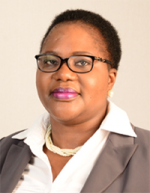 Dr. Mwelecele Ntuli Malecela is Director General of the National Intsitute for Medical Research Tanzania and is the first woman to hold this position. She holds the position of Chief Research Scientist, and is also Director of the Tanzania Lymphatic Filariasis Elimination Program.
Dr. Mwelecele Ntuli Malecela is Director General of the National Intsitute for Medical Research Tanzania and is the first woman to hold this position. She holds the position of Chief Research Scientist, and is also Director of the Tanzania Lymphatic Filariasis Elimination Program.
Mwele holds a Bsc (Hons) in Zoology from the University of Dar-es-salaam and an Msc and PhD in Parasitology from the University of London (London School of Hygiene and Tropical Medicine). Her area of specialization was filarial immunology specifically on filarial immune evasion mechanisms. Dr. Malecela is a Fellow of the Tanzania Academy of Sciences.
Mwele has worked at the National institute for Medical Research for 27 years, where she started off as a junior scientist, mainly in the field of Lymphatic Filariasis immunoepidemiology. As Director General her work has focused on research capacity strengthening and building of strong national research systems. She chairs the Medical Research Coordinating Committee (MRCC), which is the main body responsible for oversight of health research in the country. Mwele serves on several committees and boards in country related to Health Research, Science and Technology and is a strong advocate of increasing the number of women working in science related fields.
In her role as Director of the National Lymphatic Filariasis Elimination Program she brings her long research experience efforts to eliminate filariasis, and she has run the national program since its inception in 2000. She is well known for her role in advocacy campaigns that have brought to light the real extent of the problem in Tanzania. Her efforts to fight the disease have resulted in a creation of a strong team and elimination of the disease in six districts and prospects of elimination in 20 districts. She is now an Advisor to the integrated NTD program.
Mwele is currently Vice President of the International Association of Public Health Institutes (IANPHI) and a member of the WHO Strategic and Technical Advisory Committee for Neglected Tropical Diseases. Dr. Malecela is also Chair of the African Regional Program Review for Neglected Tropical Diseases; is on the International Advisory Board of Grand Challenges Canada; and serves on the council of the University of Dodoma. Until June 2010 Mwele was President of the Global Alliance to Eliminate Lymphatic Filariasis and Chair of the Representative contact group of the Alliance. Mwele is also involved in a number of philanthropic organizations, and is a member of several professional bodies and has several publications in peer -reviewed journals. Dr. Malecela has received a number of awards including the Global NTD Champions award for her work in the fight against Neglected Tropical Diseases. Dr. Malecela was recently recognized as the 100 women in Global Health featured in the Lancet.
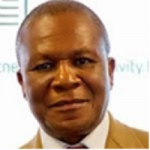 Richard Mkandawire is currently vice president of the African fertilizer and Agribusiness Partnership, a non-profit organization committed to fostering increased use and usage of fertilizer among smallholder farmers in Africa. For eight years, Richard Mkandawire was part of the leadership that drove the Comprehensive Africa Agriculture Development Programme (CAADP), an innovative framework for agricultural development established by African nations and leaders, which began as part of the New Partnership for Africa's Development (NEPAD) to eliminate hunger and reduce poverty through agriculture.
Richard Mkandawire is currently vice president of the African fertilizer and Agribusiness Partnership, a non-profit organization committed to fostering increased use and usage of fertilizer among smallholder farmers in Africa. For eight years, Richard Mkandawire was part of the leadership that drove the Comprehensive Africa Agriculture Development Programme (CAADP), an innovative framework for agricultural development established by African nations and leaders, which began as part of the New Partnership for Africa's Development (NEPAD) to eliminate hunger and reduce poverty through agriculture.
Mkandawire has received awards for his work on CAADP including the Drivers of Change Award and an honorary doctorate from the University of KwaZulu-Natal. Mkandawire came to CAADP and AFAP with decades of experience as a socio-economist and rural development expert. He has earned degrees from the University of Malawi, the University of Missouri and the University of East Anglia, and has held diverse positions as mentor, instructor, and research collaborator in multiple universities. Mkandawire is also an extraordinary Professor at the University of Pretoria.
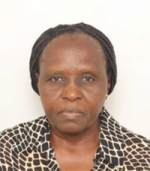 Dr. Penina Mlama is a Professor in the Department of Fine and Performing Arts, in the College of Humanities at the University of Dar-es-Salaam. She is currently holding Professor of the Mwalimu Julius Nyerere Chair in Pan Africans Studies of the University of Dar es Salaam. She has held a number of positions at the University of Dar-es-Salaam including Head of the former Department of Arts, Music, and Theatre, Associate Dean of Research and Publications, Dean of the Faculty of Arts and Social Sciences, and Chief Academic Officer. She has also served as the Executive Director of a Pan African Organization: the Forum for African Women Educationalists based in Nairobi Kenya and the Campaign for Female Education, Tanzania. In addition to her active roles in research consultancy projects, Dr. Mlama has published books and journal articles on a wide variety of subjects, including education in Africa, gender, and theatre education. Her numerous artistic endeavors include theater performance, film production, and screen and stage writing. In 2011, Prof. Mlama was awarded the University of Dar es Salaam Golden Jubilee Award for her service to the university and international community.
Dr. Penina Mlama is a Professor in the Department of Fine and Performing Arts, in the College of Humanities at the University of Dar-es-Salaam. She is currently holding Professor of the Mwalimu Julius Nyerere Chair in Pan Africans Studies of the University of Dar es Salaam. She has held a number of positions at the University of Dar-es-Salaam including Head of the former Department of Arts, Music, and Theatre, Associate Dean of Research and Publications, Dean of the Faculty of Arts and Social Sciences, and Chief Academic Officer. She has also served as the Executive Director of a Pan African Organization: the Forum for African Women Educationalists based in Nairobi Kenya and the Campaign for Female Education, Tanzania. In addition to her active roles in research consultancy projects, Dr. Mlama has published books and journal articles on a wide variety of subjects, including education in Africa, gender, and theatre education. Her numerous artistic endeavors include theater performance, film production, and screen and stage writing. In 2011, Prof. Mlama was awarded the University of Dar es Salaam Golden Jubilee Award for her service to the university and international community.
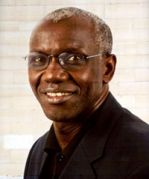 Prof. Ibrahima Thioub is the incumbent Rector /President of the Assembly of UCAD since August 2014.
Prof. Ibrahima Thioub is the incumbent Rector /President of the Assembly of UCAD since August 2014.
Prof. Ibrahima Thioub did his Baccalaureate in Literature in 1978, and Certificate of Specialization in History of Africa in 1981. He did his Masters in 1982 and a doctorate degree in 1989 from the University of Paris.
Professor of History at UCAD since 1990 and an Associate Member of the Nantes Institute for Advanced Study Foundation since 2009, Ibrahima Thioub specializes in slavery studies. He is regarded as a specialist in the social and cultural history of Africa. He was awarded honorary Doctorate degree by the University of Nantes, France, in March 2012.
Having command on three languages, Wolof (native), French (working) and English (spoken), Prof. Thioub teaches courses on the history and historiography of Senegal; history of Islam in Senegal (Xth-XXth centuries); and Slavery in Africa.
He was a visiting professor at the EHESS and several universities in the United States, Europe and Africa. He was the international director of an international research program on alcohol and drug abuse in Asian countries (Nepal, India, Sri Lanka) and in many African countries (Gambia, Sierra Leone, South Africa). In 2008-2009 he was a researcher-resident at Wissenschaftskolleg in Berlin.
Prof. Thioub’s current research interests are in slavery in daily life of Saint-Louis, Senegal (18th-19th centuries); and intellectual history of Francophone Africa and African identities. He casts a critical eye on African readings of slavery and the Atlantic slave trade. Besides the employment of slaves in economic activities, he studied their role in social relations and their legal expressions in private and public spaces. His study is part of a historical perspective, paying particular importance to the changes recorded in the time of the city and its environment.
He founded the African Centre for Research on Treaties and Slavery (CARTE) and serves as its Director. He has also been rendering services as:
He has been contributing to different councils, boards and associations as following:
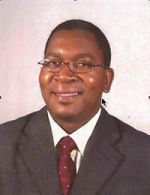 Prof. Doutor Emílio Tostão is currently the director of the Research Center for Agricultural Policies and Programs at Eduardo Mondlane University in Mozambique. From 2010 to 2014, he served as the Dean of the Faculty of Agronomy and Forestry Engineering in the same university. He holds an MSc and a PhD in Agricultural Economics from Oklahoma State University, and a Licenciatura in Rural Engineering from Eduardo Mondlane University. His research focus are in agricultural marketing, production and resource economics, and quantitative methods for agriculture. He teaches Applied Statistics, and Econometrics at post-graduate level, and supervises teaching of Agricultural Commercialization, and Data Analysis at undergraduate level.
Prof. Doutor Emílio Tostão is currently the director of the Research Center for Agricultural Policies and Programs at Eduardo Mondlane University in Mozambique. From 2010 to 2014, he served as the Dean of the Faculty of Agronomy and Forestry Engineering in the same university. He holds an MSc and a PhD in Agricultural Economics from Oklahoma State University, and a Licenciatura in Rural Engineering from Eduardo Mondlane University. His research focus are in agricultural marketing, production and resource economics, and quantitative methods for agriculture. He teaches Applied Statistics, and Econometrics at post-graduate level, and supervises teaching of Agricultural Commercialization, and Data Analysis at undergraduate level.
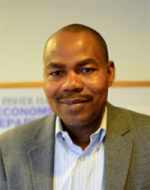 Leonard Wantchekon is Professor in Politics, International Affairs, and Economics (associated faculty) at Princeton University. His research broadly focuses on Political and Economic development, particularly in Africa. His specific interests include topics such as democratization, clientelism and redistributive politics, resource curse, education and social mobility and long-term social impact of historical events. He is the author of numerous publications in leading academic journals, including Education and Human Capital Externalities: Evidence from Colonial Benin (with Marko Klasnja and Natalia Novta), in Quarterly Journal of Economics, "The Slave Trade and the Origins of Mistrust in Africa" (with Nathan Nunn), in the American Economic Review; "The Paradox of "Warlord" Democracy: A Theoretical Investigation," in the American Political Science Review (2004); Clientelism and Voting Behavior: A Field Experiment in Benin, World Politics (2003) as well as "Electoral Competition under the Threat of Political Unrest" (with Matthew Ellman) in the Quarterly Journal of Economics (2000).
Leonard Wantchekon is Professor in Politics, International Affairs, and Economics (associated faculty) at Princeton University. His research broadly focuses on Political and Economic development, particularly in Africa. His specific interests include topics such as democratization, clientelism and redistributive politics, resource curse, education and social mobility and long-term social impact of historical events. He is the author of numerous publications in leading academic journals, including Education and Human Capital Externalities: Evidence from Colonial Benin (with Marko Klasnja and Natalia Novta), in Quarterly Journal of Economics, "The Slave Trade and the Origins of Mistrust in Africa" (with Nathan Nunn), in the American Economic Review; "The Paradox of "Warlord" Democracy: A Theoretical Investigation," in the American Political Science Review (2004); Clientelism and Voting Behavior: A Field Experiment in Benin, World Politics (2003) as well as "Electoral Competition under the Threat of Political Unrest" (with Matthew Ellman) in the Quarterly Journal of Economics (2000).
Professor Wantchekon is a fellow of the American Academy of Arts and Sciences and a member of the Executive Committee of the Afrobarometer Network. He served as the Secretary of the American Political Science Association (2009) and the Ibrahim Index Technical Committee of the Mo Ibrahim Foundation (2007-2011). Finally, Professor Wantchekon is the founder of the Institute for Empirical Research in Political Economy (www.ireep.org ), and the African School of Economics (http://africanschoolofeconomics.com/) based in Abomey Calavi, Benin.
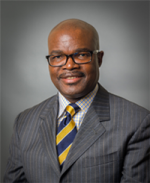 Professor Paul Tiyambe Zeleza is Vice Chancellor (President) of the United States International University-Africa, Nairobi, Kenya, a position he assumed on January 1, 2016.
Professor Paul Tiyambe Zeleza is Vice Chancellor (President) of the United States International University-Africa, Nairobi, Kenya, a position he assumed on January 1, 2016.
Prior to joining USIA-A, he was Vice President of Academic Affairs at Quinnipiac University in Connecticut, USA. Previously he was Dean of the Bellarmine College of Liberal Arts and President's Professor of History and African American Studies at Loyola Marymount University. He also served as head of the Department of African American Studies and the Liberal Arts and Sciences Distinguished Professor at the University of Illinois at Chicago, taught at the Pennsylvania State University, and was Director of the Center for African Studies and Professor of History and African Studies at the University of Illinois at Urbana-Champaign. Before coming to the United States in 1995 he was College Principal and Professor of History and Development Studies at Trent University in Ontario, Canada. Earlier he worked at the University of Malawi, University of the West Indies, and Kenyatta University. Since 2006 he has held the title of Honorary Professor at the University of Cape Town, South Africa. In Fall 2015, he was a fellow at Harvard University.
In the early 2000s he worked as a consultant for the Ford and MacArthur foundations on their initiatives to revitalize higher education in Africa and as an adviser to the United Nations Research Institute for Social Development for a project on Policy Report on Gender and Development: 10 Years after Beijing. His research project on the African academic diaspora conducted for the Carnegie Corporation of New York in 2011-12 led to the establishment of the Carnegie African Diaspora Fellowship Program in 2013 that has to date sponsored scores of African born academics in the United States and Canada to work with dozens of universities in Ghana, Kenya, Nigeria, South Africa, Tanzania, and Uganda. He is a past president of the U.S. African Studies Association (2008-2009).
Dr. Zeleza earned his B.A. with Distinction from the University of Malawi and an M.A from the University of London, where he studied African history and international relations. He holds his Ph.D. in economic history from Dalhousie University in Halifax, Nova Scotia, Canada. Dr. Zeleza's academic work has crossed traditional boundaries, ranging from economic and intellectual history to human rights, gender studies, and diaspora studies.